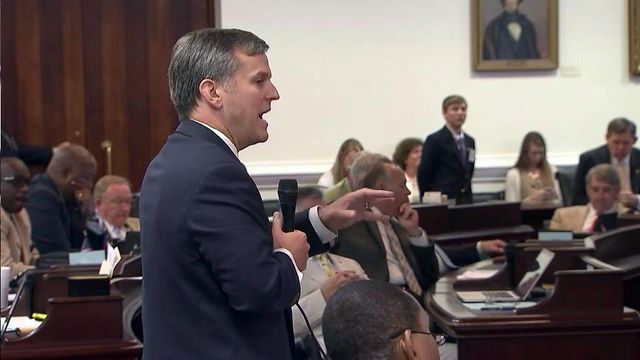Rural-urban divide rears its head in sales tax debate
Senators from small counties say a sales tax bill "levels the playing field" with larger, urban counties. Lawmakers from urban areas say the bill will hurt their ability to recruit new jobs.
Posted — UpdatedMuch of the bill concerns giving the Commerce Department new ways to lure businesses. For example, it pours more money into the state's Job Development Investment Grant fund, which provides grants to new and expanding companies, as well as a creating a new job catalyst fund, aimed a helping job recruiters close deals with major new employers. Another provision would allow small investors to provide crowd-funding to small companies.
Those economic development provisions were mainly uncontroversial, but an attached sales tax measure that has been the focus over controversy over the past week once again sparked debate.
For all but six of North Carolina's 100 counties, the measure would make it easier to raise their local sales tax rate as high as 2.5 percent. Most counties are below that cap and unable to use existing authority to raises taxes for transportation project. The proposed law would allow them to put referenda before voters asking to raise sales taxes in quarter-cent increments for either education, transportation, general purposes or some combination of the three.
Two counties – Durham and Orange – already have local sales tax rates of 2.75 percent and would be grandfathered in under the bill.
Four other large, urban counties – Wake, Mecklenburg, Forsyth and Guilford counties – currently have the authority to ask voters to raise local sales taxes up to that 2.75 percent limit but would be limited to a 2.5 percent under this bill.
"You are trying to slow down the economic engines of North Carolina," Sen. Josh Stein, D-Wake, told his colleagues during debate on the Senate floor on Wednesday.
The measure would force Wake County to choose between keeping its commitment of dedicating a half-cent of sales tax to a local transportation consortium or following through with a quarter-cent sales tax increase to help fund education.
"This bill levels the playing field for all counties," said Sen. Rick Gunn, R-Alamance.
Gunn and other Republicans made the case that allowing big counties to have access to extra sales taxes would not only slow down economic growth generally but would also make it unfair to smaller counties with small tax bases.
"It's becoming two North Carolinas, where the rich continue to get richer and the poor get poorer," said Sen. Harry Brown, R-Onslow.
But senators from urban counties argued that the success of big cities ultimately helps everyone, allowing the state to send more money to low-wealth, rural school districts for example.
"This doesn't have to be a rural-urban fight," said Sen. Mike Woodard, D-Durham.
"Urban areas have different issues to deal with," Raleigh Mayor Nancy McFarlane said.
McFarlane said she has no problem making sales tax options equal for all counties, but she doesn't feel growth options should be taken away from Wake County.
"They're even denying the county the ability to ask the voters what they're priorities are," she said. "So, it's not even a matter of imposing taxes. It's a matter of letting voters decide."
Sen. Jeff Jackson, D-Mecklenburg, pointed out that Mecklenburg County has scheduled a sales tax referendum this fall but would be prevented from going to the voters if this bill passes.
"If you're for local control, you have to be against this bill," Jackson said.
Sen. Neal Hunt, R-Wake, said he was inclined to vote against the measure, but disagreed with the criticism being leveled by Democrats. He left the chamber before a final vote was taken on the measure. Senate President Pro Tem Phil Berger said that Hunt left to attend Rep. Jim Fulghum's funeral, however Hunt left 30 minutes before the funeral began at a church that is only two blocks from the Legislative Building.
Senators voted 33-16 to give the bill tentative approval, but it was not along party lines. Five Democrats, including Sen. Floyd McKissick, D-Durham, voted for the measure. Four Republicans, including Sens. Chad Barefoot, R-Wake, and Tamara Barringer, R-Wake, voted against the measure.
Barringer said on the floor that she opposed the crowd-funding measure, saying she believed it runs afoul of federal law.
The Senate must take a second floor vote to confirm its approval before sending the measure to the House, where its fate is less certain.
Related Topics
• Credits
Copyright 2024 by Capitol Broadcasting Company. All rights reserved. This material may not be published, broadcast, rewritten or redistributed.





